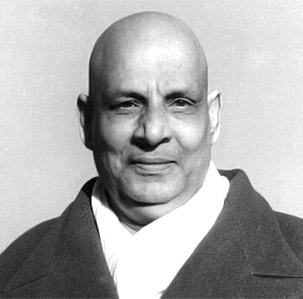 Swami Sivananda achieved the cosmic consciousness and his philosophy was to feel the God and divinity everywhere and in every part of life.
Swami Sivananda achieved the cosmic consciousness and his philosophy was to feel the God and divinity everywhere and in every part of life.
According to Swami Sivananda, the aim of philosophy is right living. The meaning of right living depends on how it is defined. It is a life of wisdom, free from the imperfection, which characterises un-philosophical life. Philosophy, as said by Swami, is neither intellectual diversion nor aristocratic pedantry which overlooks the facts of experience in the world. As against a feat of scholarship or a mere hobby of the care-free mind, philosophy is the intelligent analysis of the implications of experience and a scientific theory evolved from such wise meditations for the purpose of regulating the functions responsible for the various experiences in the world. Philosophy is, therefore, the great art of the perfect life, a kind of life where the common notion of life is transcended and where the Supreme Life, which is identical with existence itself, is realised.
The philosophy taught by him is neither a dreamy, subjective, world-negating doctrine of illusion, nor a crude world-affirming theory of humanism. It is the theory of the divinity of the universe, the immortality of the soul of man, which is identical with the Absolute Self of the universe, there being an essential unity of everything in the universe with the highest Brahman, which is the only existing Reality. The Vedanta does not shut its eyes to the heart-rending pitiable condition of the world, nor does it ignore the body and the mind with their downward pull towards an empirical life, though the province of the Vedanta is supra-mundane.
The philosophy of Swami Sivananda entails that some factors are responsible for building up the philosophy of life. To adjust, adapt and accommodate, to see good in everything, to bring to effective use all the principles of nature in the process of evolution towards Self-realisation along the path of an integrated adjustment of the human powers and faculties, are said to be some of the main factors. To Swami Sivananda, philosophy is not merely a love of wisdom, but actual possession of it. In all his writings he has prescribed methods for overcoming and mastering the physical, intellectual, mental and vital layers of consciousness, in order to be able to proceed with the Sadhana for self-perfection. His creed was to behold the Lord in every being or form, to feel Him everywhere, at all times and in all conditions of life, to see, hear, taste and feel everything as God. He believed to live in God, to melt in God, and to dissolve in God.
Swami Sivananda said that human life is not complete with its observable activities and that there is something above human perception controlling and directing all that is visible. By his perception he perceived the realities behind what is called life on earth. Moreover, as per his sayings, the unrest and feverish anxiety that characterise man`s ordinary existence here bespeak a higher goal that he has to reach one day or the other.
Materialism and scepticism reign supreme, when man gets entangled in selfishness, greed, hatred and lust, he naturally forgets what is beneath his own skin. These are the reasons why man gets irritated over little things and begins to fight and quarrel; in short, man becomes miserable.
The philosophy of Swami Sivananda is neither a dreamy, subjective, world-negating doctrine of illusion, nor a crude world-affirming theory of sense-ridden humanism. It is the fact of the divinity of the universe, the immortality of the soul of man; the unity of creation with the Absolute that he feels is the only doctrine worth considering. As the one all-pervading Brahman appears as the diverse universe in all the planes of its manifestation, the aspirant has to pay his homage to the lower manifestations before he steps into the higher.









